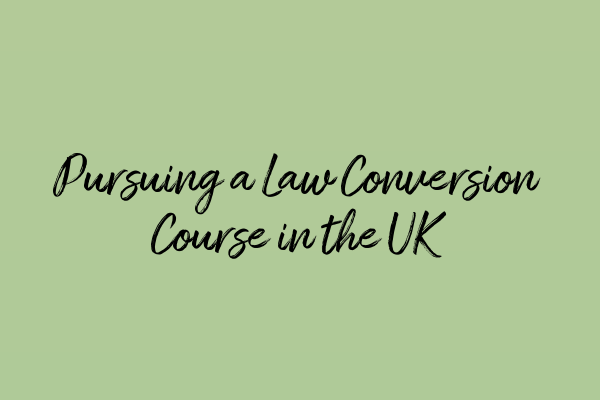Pursuing a Law Conversion Course in the UK
Are you interested in pursuing a career in law but have a non-legal background? Don’t worry, you’re not alone. Many individuals from various academic disciplines decide to switch to a legal career, and the good news is that it’s never too late to make the transition.
In the UK, one of the most common routes for non-law graduates to become solicitors or barristers is by undertaking a Law Conversion Course, also known as the Graduate Diploma in Law (GDL) or Common Professional Examination (CPE). In this blog post, we will explore the ins and outs of pursuing a Law Conversion Course in the UK.
What is a Law Conversion Course?
A Law Conversion Course is a postgraduate program designed to introduce individuals with non-law backgrounds to the fundamentals of law. It provides a comprehensive and accelerated foundation in legal studies, allowing candidates to develop the necessary knowledge and skills required for a legal career.
Why Pursue a Law Conversion Course?
There are several reasons why pursuing a Law Conversion Course can be a great career move:
- Flexibility: By undertaking a Law Conversion Course, you open up a wide range of career options within the legal profession. You can choose to become a solicitor, barrister, legal consultant, or even work in legal research or policy.
- Professional Development: The course provides you with a solid foundation in legal principles, enabling you to navigate complex legal issues confidently and competently.
- Increased Employability: Having a legal qualification significantly enhances your employability in various sectors, including law firms, government agencies, NGOs, and corporate organizations.
Applying for a Law Conversion Course
When applying for a Law Conversion Course, you will need to meet certain eligibility criteria. While requirements may vary between institutions, generally, you will need:
- A recognized undergraduate degree in any discipline
- A minimum GPA or equivalent
- An English language proficiency test score (if applicable)
To increase your chances of acceptance, it’s essential to submit a well-crafted personal statement highlighting your motivation for pursuing a legal career and demonstrating your relevant skills and experiences. Additionally, strong letters of recommendation can significantly strengthen your application.
It’s worth noting that competition for places on Law Conversion Courses can be fierce, so it’s advisable to apply early and thoroughly research the entry requirements of different institutions.
Structure and Duration of a Law Conversion Course
A Law Conversion Course typically takes one year to complete if studied full-time. However, many institutions offer part-time or online options, allowing you to study at your own pace.
The course curriculum covers core areas of law, such as contract law, criminal law, constitutional law, and more. You will study through a combination of lectures, seminars, case studies, and practical exercises, developing essential legal research, writing, and advocacy skills.
Throughout the course, you will also have the opportunity to engage in various extracurricular activities, such as mooting competitions and pro bono work, which can further enhance your practical legal skills and make you stand out to potential employers.
Successful Career Paths after a Law Conversion Course
Graduates of Law Conversion Courses can pursue a variety of exciting careers in the legal field. These may include:
- Solicitor
- Barrister
- Legal Advisor
- Legal Consultant
- Policy Analyst
- Corporate Lawyer
Whether you choose to specialize in criminal law, corporate law, family law, or any other area, there are numerous opportunities waiting for you.
To excel in specific areas of law, it’s important to gain practical experience and continuously update your legal knowledge. Consider taking advantage of resources like SQE Prep: Tips and Tricks to Excel in Criminal Law for valuable insights on preparing for the Solicitors Qualifying Examination (SQE) or Cross-Examination Techniques: Mastering the Art of Questioning to improve your advocacy skills.
If you aspire to work on unique legal cases, you might be interested in exploring articles like Private Prosecutions: Exploring Non-Governmental Prosecutions in Criminal Cases or Ethical Challenges in Criminal Defence: Navigating Dilemmas.
Understanding the legal parameters surrounding different areas of law, such as assault and battery, is also crucial. For a comprehensive guide, read Assault and Battery Laws: Understanding the Legal Parameters.
Conclusion
The decision to pursue a Law Conversion Course is an excellent step towards a fulfilling and successful legal career. By gaining a solid foundation in law through a postgraduate program, you enhance your employability and open doors to various opportunities within the legal profession.
If you’re ready to make the transition from your non-legal background to the exciting world of law, start researching Law Conversion Courses today and take the first step towards your dream career.


Leave a Reply